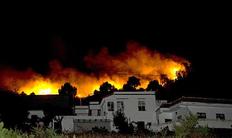Rasmussen: 'We must focus more on the civilian side of this conflict' ( BBC ) -Monday, 3 August 2009 18:12 UK Nato's priority must be the war in Afghanistan, including negotiations with moderate members of the Taliban, the organisation's new leader says. Secretary-General Anders Fogh Rasmussen said Nato must prevent Afghanistan from "becoming again a grand central station of international terrorism". He said his second priority would be improving ties with Russia, though he admitted there would be difficulties. One of his other ideas is to create a "standing anti-piracy" capability. He spoke on Monday, as a bomb attack in the western Afghan city of Herat killed at least 12 people and injured about 20. Insurgent attacks on security forces have been increasing in the run-up to the presidential election on 20 August. Nato's new leader replaces Jaap de Hoop Scheffer, who repeatedly warned that efforts to subdue the Taliban in Afghanistan remained the alliance's greatest challenge. 'Lot at stake' Mr Rasmussen, a former Danish prime minister, said he wanted Nato to work more with civilian organisations. "Nato is a strong military alliance and we need a strong military effort in Afghanistan," he said. "But to win the peace and to win hearts and minds we need to provide Afghan people with better life opportunities and assist the government in the development of democratic institutions." To help achieve that, Nato needed to expand its capacity to work with the European Union, United Nations and other civilian groups, he added. While appreciating the increase in troops that Nato's allies had pledged, Mr Rasmussen said there was "a lot at stake", both internationally and for Nato in Afghanistan, and warned that reinforcements might be needed. "I will not exclude the possibility that we will need more troops in the future. We have to do what it takes to prevail," he later told the BBC. The launch in 2001 of Nato's International Security Assistance Force (Isaf) for Afghanistan was the organisation's first and largest ground operation outside Europe. As of June 2009, Isaf had more than 61,000 personnel from 42 different countries including the US, Canada, European countries, Australia, Jordan and New Zealand. The largest contributing nations are the US and Britain. They provide about 28,850 and 8,300 troops respectively.  US soldiers are among the thousands of Nato-led troops in Afghanistan | Mr Rasmussen said that he would work with European Nato members to remove the "national caveats" on how their forces could be used. "I think we owe it to our commanders in the field that they have the greatest possible flexibility in pursuing their important goals." He also said that Afghans would have to take lead responsibility for security in most of their country during his four-year term. "We should develop a greater capacity within the Afghan National Army, and also within the Afghan National Police. The criteria of success will be to hand over gradually the responsibility for security to the Afghans themselves, province by province," he told the BBC. He said he would try to address public concern about increasing casualties, but that people had to realise the risks of inaction. "If Afghanistan once again becomes a safe haven for terrorists, then we can all be hit by terrorists again. This is not only a question about the United States - Europe could be hit as well," he said. 'Negative impact' As the first anniversary of a brief war between Russia and Georgia looms, Mr Rasmussen said the conflict had had a "very negative impact on relations between Nato and Russia". It erupted on 7 August last year as Georgia tried to retake control of South Ossetia. Russia quickly repelled the assault, and built up its military presence in both South Ossetia and Georgia's other breakaway region of Abkhazia. Nato's new leader said the differences between the alliance and Moscow should not overshadow common security concerns, such as terrorism. "I consider it a very important challenge for me to convince the Russian people and Russian leadership that Nato is not an enemy of Russia, Nato is not directed against Russia," he said. Speaking more broadly about Nato's role, Mr Rasmussen described Nato as "the ultimate insurance policy" for almost one billion people in 28 countries. "I want to see Nato reach its full potential as a pillar of global security," he said.
| 


